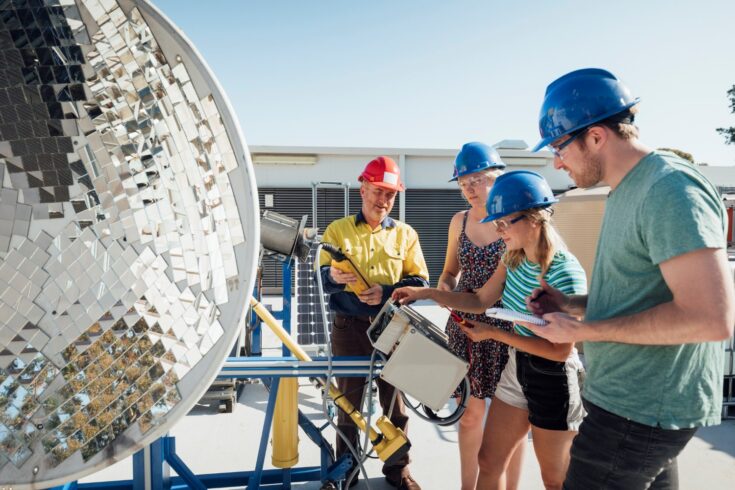Local renewable energy projects and new ways of producing food are just two of the test areas to be explored by a new £10 million UKRI investment.
These initiatives focus on ‘whole systems’ approaches to reaching net zero carbon emissions across the UK.
The two nationwide research projects will be led by the universities of Bath and Aberdeen.
Partners taking part in these projects include:
- businesses
- community enterprises
- local authorities
- health and care providers
- Nuclear Decommissioning Authority
A systems approach means looking at a problem or situation as a whole, rather than just focusing on individual parts.
For example, when fixing a car considering how the engine, tyres, brakes and other parts all work smoothly together, rather than just focusing on the engine.
Researchers from many different fields involved
Faced with the much more complex challenge of net zero, these transdisciplinary programmes will involve researchers from areas such as:
- energy
- environment
- engineering
- economics
- law and policy
- social sciences
Working with non-academic stakeholders, they will explore the complexity of the interactions between different elements, actors and drivers at different scales from a business to a sector, a region or a country.
Latest investment through UKRI’s ‘Building a green future’ strategic theme
This is UKRI’s latest investment through its ‘Building a green future’ strategic theme.
It aims to accelerate the green economy by supporting research and innovation that delivers on national priorities and unlocks solutions essential to achieving net zero in the UK by 2050.
The two programmes being supported are:
Integrated Systems Approaches for Accelerating a Just Transition (JUST-Systems)
The JUST-Systems programme is led by University of Aberdeen.
It will employ a systems approach that co-designs technical evaluations of local energy systems into practical pathways and accelerated action that builds upon community aspirations for sustainable, liveable and resilient places.
JUST-Systems will focus on five unique test cases.
This includes:
- working with the Torry Retrofit Project (Aberdeen), a new community initiative born out of a citizen assembly
- the Community Renewable Energy Project (East Ayrshire Council) that will develop new local energy distribution networks, storage and community-based generation
- developing an energy transition strategy with Clackmannanshire Council
- decarbonisation of heat using geothermal energy in south-east England
- examining the implications for net zero in the Welsh social care sector
People-Led Net Zero: accelerating our transition
The People-Led Net Zero programme is led by University of Bath.
It will be a people-led, practical, systems-based approach that enables business and industry to decarbonise quickly, efficiently and productively in a fair and just manner.
Four test cases lie at the heart of the programme’s approach using action-based research.
With people at their core, they build on existing research and industry needs, encompassing the whole value chain.
They involve:
- Nuclear Decommissioning Authority: Dounreay
- Bath and north-east Somerset: decarbonisation of office buildings
- Bath and north-east Somerset: Mobility as a Service
- Cellular Agriculture Manufacturing Hub: novel food production
Objectives driving the research include being able to select future-state scenarios for an accelerated transition to net zero and identifying rules and create minimal viable system model for a rapid and just transition.
Outputs that support a sustainable net zero transition
Announcing the new investments, Professor Louise Heathwaite Natural Environment Research Council Executive Chair and UKRI Executive Champion for Building a Green Future, said:
The journey towards net zero carbon emissions is one of our most urgent and complex national challenges, so it’s important to understand the effects at a systems level of the many different component parts working together, for example, avoiding planting trees where the carbon store in the soil at depth is already stable.
Through these projects UKRI aims to drive outputs that support a just, prosperous, sustainable and resilient net zero transition, removing barriers to interventions whilst at the same time avoiding unintended consequences.

